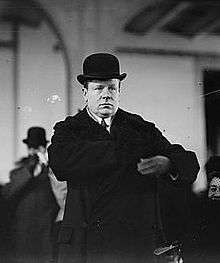Henry Symes Lehr
| Henry Symes Lehr | |
|---|---|
 | |
| Born | March 28, 1869 |
| Died | January 3, 1929 |
| Spouse(s) | Elizabeth "Bessie" Wharton Drexel |
| Parent(s) | Robert Oliver Lehr |
| Relatives | Alice Lehr Morton; and a brother Louis Lehr |
Henry Symes "Harry" Lehr (March 28, 1869 – January 3, 1929) was an American socialite during the Gilded Age.
Early life
Henry Symes Lehr was born on March 28, 1869.[1] His father, Robert Oliver Lehr, was a tobacco and snuff importer who became the German consul in Baltimore.[2] He was the fourth child in a family of seven. He had a sister Alice Lehr Morton; and a brother Louis Lehr, who was a physician.[3]
Adult life
He attempted to establish himself as successor to Ward McAllister, arbiter elegantiarum of New York's Four Hundred, the collection of Knickerbocker and industrial families he created as a bulwark against the new wealth of the Gilded Age. He was known for staging elaborate parties alongside Marion "Mamie" Fish, such as the so-called "dog's dinner", in which 100 pets of wealthy friends dined at foot-high tables while dressed in formal attire[4] At a later party, he impersonated the Czar of Russia, and was henceforth dubbed "King Lehr".[5]
Lehr was never accepted as an equal by high society. Grace Graham Wilson, wife of Cornelius Vanderbilt III, who assumed the throne of Mrs. Astor after her death, had little regard for Lehr's antics. When his patron Mrs. Astor died, Lehr allied himself with Mrs. Stuyvesant Fish of New York and Newport. Together, they bucked the formality and rigidity that characterized social life in Gilded Age New York. The result was practical jokes and entertainments that brought disgrace onto "The Four Hundred" and caused their rebuke in the nation's pulpits and periodicals.
Personal life

He was married to heiress Elizabeth "Bessie" Wharton Drexel.[6][7] He refused to sleep with her on their wedding night.[8] She stayed in a loveless, unconsummated marriage for 28 years, not wishing to upset her conservative, staunchly Catholic mother, née Lucy Wharton.[9]
Death
He was diagnosed in 1923, and had a brain tumor removed in 1927. He died on January 3, 1929 of a brain malady at Johns Hopkins Hospital in Baltimore.[2]
Further reading
- Washington Post; September 26, 1903. Some Thoughts on Harry Lehr. Those very industrious and entertaining gossips who spend so much time exploiting the antics of Mr. Harry Lehr do not appear to have considered the possibility that he may be anything rather than the fool they would have him. This very alert and resourceful young gentleman, it will be well to remember, has prospered most amazingly as the result of his more or less dignified activities in connection with the Newport smart set.
- New York Times; December 9, 1910, Friday. Henry Symes Lehr Ill. But Is Recovering at His Mother's Home. Deny Disagreement with Wife.
- Lehr appears as a supporting character in Gore Vidal's novel Empire.
References
- ↑ "Lehr, Harry". Find a Grave. Retrieved September 26, 2016.
- 1 2 "Harry S. Lehr Dies. Once Social Leader. Succumbs To A Brain Malady in Johns Hopkins Hospital, Baltimore. Late Mrs. Astor's Adviser Noted For Daring And Originality Of His Parties. Married Mrs. J. V. Dahlgren, Heiress. Quickly Got Into Limelight. Furor Over "Monkey Dinner" Story. An Excellent Musician.". New York Times. January 4, 1929.
Baltimore, January 3, 1929. Harry Symes Lehr, for many years prominent in society of New York, Newport, Baltimore and Paris, died today of a brain disorder at Johns Hopkins Hospital, where he had been a patient for several weeks.
- ↑ "Harry Lehr's sister dies. Mrs. Alice Morton Had Lived in France Since Her Marriage.". New York Times. August 24, 1927.
- ↑ Vanderbilt II, Arthur T. Fortune's Children. Wm. Morrow and Co., 1989: 243. ISBN 0-688-07279-8.
- ↑ Vanderbilts, 244
- ↑ "Lady Decies, Widow of Irish Peer, Dies; Former Elizabeth Drexel of Philadelphia Was Once the Wife of Harry Lehr.". New York Times. June 14, 1944.
- ↑ "Record of the Rich". Time (magazine). August 5, 1935. Retrieved 2007-07-21.
In Paris in 1929 Mrs. Elizabeth Drexel Lehr heard that her husband was dead. To the daughter of Philadelphia Banker Joseph William Drexel, that event meant that the "tragic farce" of a 28-year marriage had ended, that she was now free to tell her story. A bitter, disillusioned book, "King Lehr" is memorable for the lurid light it throws on U. S. Society of the Gilded Age, may confidently be opened as one of the most startling and scandalously intimate records of life among the wealthy yet written by one of them.
- ↑ Vanderbilt II, Arthur T. Fortune's Children. Wm. Morrow and Co., 1989: 235-7. ISBN 0-688-07279-8
- ↑ Decies, Lady (1935). King Lehr and the Gilded Age. Bedford, Massachusetts: Applewood Books. ISBN 1-55709-963-4.